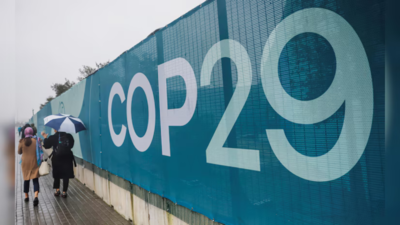
BAKU: With negotiations at COP29 entering the second week, India on Monday opposed any kind of unilateral trade barrier and pitched for ‘four important aspects of global climate action’, saying the ambitious action oriented approach hinges on bold actions from those countries (developed nations whose high historical emissions led to climate change) who are obligated to take the lead in economy-wide emission reductions.
In a clear reference to the EU’s Carbon Border Adjustment Mechanism (CBAM), New Delhi pointed out how some countries are shifting to ‘unilateral measures’ resulting in shifting of financial burden of mitigation actions to developing nations. The CBAM is a tool to put a price through imposing border tax on carbon intensive goods, like iron & steel, aluminium and cement, that are entering the EU. Once it is implemented from 2026, it will put a tariff burden on such products of developing countries, including India and China, and impact their trade.
“There is a need to recognise the negative impacts on developing nations due to such unilateral trade measures in the context of climate change,” said India’s environment secretary and deputy leader of the country’s delegation, Leena Nandan, while intervening during the high-level ministerial roundtable on pre-2030 ambition.
The four aspects of global climate action highlighted by India include the need for scaling up innovative actions through ‘barrier and restrictions free’ technology transfer; climate finance for enabling and implementing climate actions; enhancing international cooperation; and mutual trust.
India also underlined that the developing nations should not be burdened with the rich nations’ failures on their pre-2020 mitigation targets, and developed countries should not put Intellectual Property Rights (IPS) barriers to scaling and transfer of technologies to the developing nations.
“New technologies and solutions are needed to drive the transition to a low-carbon economy. However, innovation in areas like clean energy, carbon removal etc is still in early stages and there are barriers to scaling and transfer to the developing nations,” said the environment secretary.
Noting that the COP29 should come up with “tangible and meaningful outcomes on deployment of technology” to the developing countries, she said, “India is calling attention to the importance of knowledge and technology transfer without Intellectual Property Rights (IPR) restrictions for green technologies, and we are emphasising the need for overcoming IPR barriers.”
Putting responsibilities of making the COP29 a success on rich nations, Nandan said it is an opportunity for the developed countries to ensure the success of this COP and foster trust to realise important milestones in climate ambitions by 2030. “Achieving net-zero by the developed countries would set the foundation for a more sustainable and resilient world in this critical decade and the decades to come,” she said.
On a critical issue of finance which is considered as the core of the ongoing negotiation process, the secretary said, “COP29 is a milestone COP for climate finance. It should ensure the long pending commitments from developed nations for providing substantial financial resources are made and that such climate finance is equitable and accessible.”
